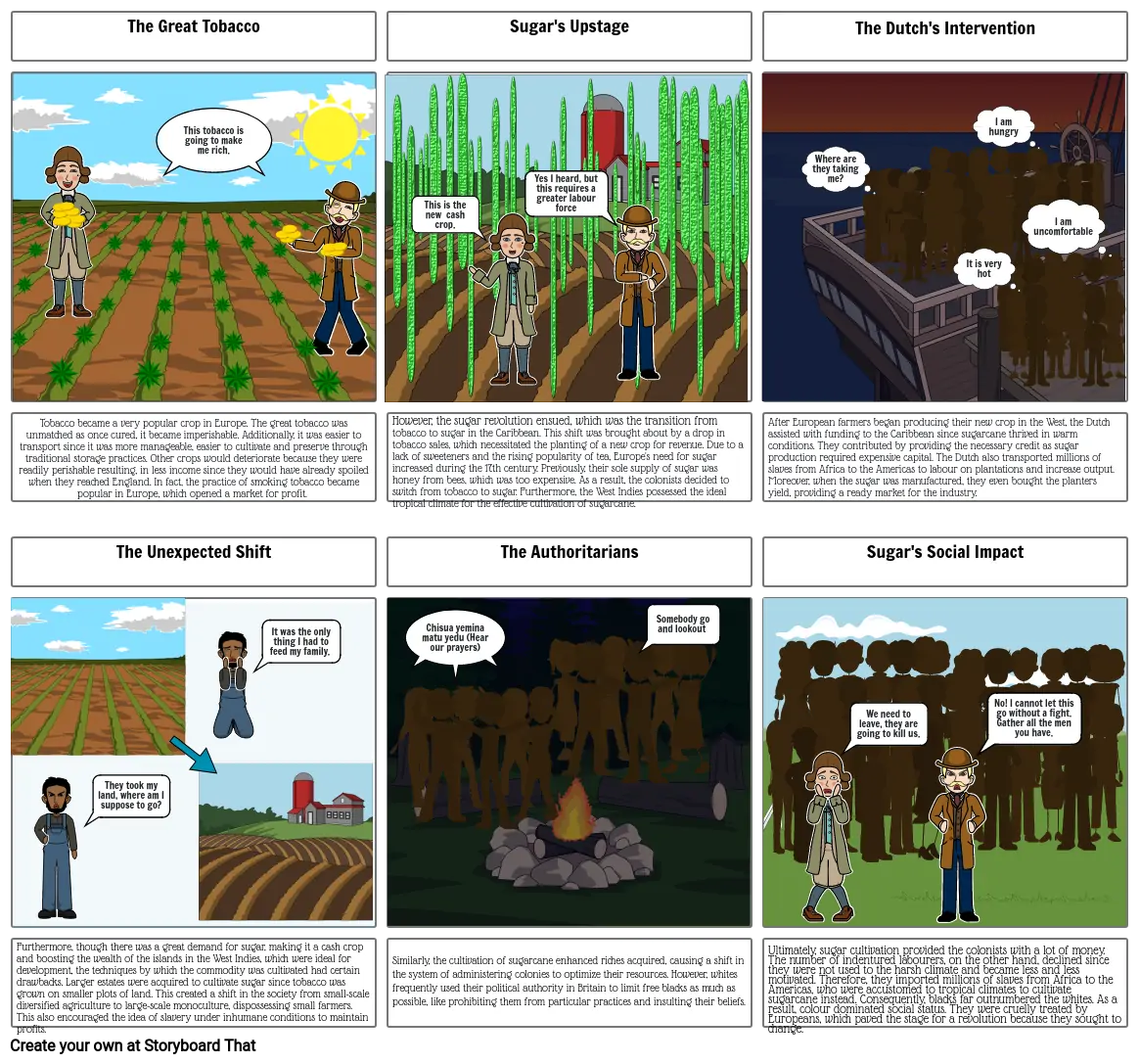Kathryn Mclean-Sugar Revolution Cartoon

نص القصة المصورة
- The Great Tobacco
- This tobacco is going to make me rich.
- Sugar's Upstage
- This is the new cash crop.
- Yes I heard, but this requires a greater labour force
- The Dutch's Intervention
- Where are they taking me?
- It is very hot
- I am hungry
- I am uncomfortable
- Tobacco became a very popular crop in Europe. The great tobacco was unmatched as once cured, it became imperishable. Additionally, it was easier to transport since it was more manageable, easier to cultivate and preserve through traditional storage practices. Other crops would deteriorate because they were readily perishable resulting, in less income since they would have already spoiled when they reached England. In fact, the practice of smoking tobacco became popular in Europe, which opened a market for profit.
- The Unexpected Shift
- It was the only thing I had to feed my family.
- However, the sugar revolution ensued, which was the transition from tobacco to sugar in the Caribbean. This shift was brought about by a drop in tobacco sales, which necessitated the planting of a new crop for revenue. Due to a lack of sweeteners and the rising popularity of tea, Europe's need for sugar increased during the 17th century. Previously, their sole supply of sugar was honey from bees, which was too expensive. As a result, the colonists decided to switch from tobacco to sugar. Furthermore, the West Indies possessed the ideal tropical climate for the effective cultivation of sugarcane.
- The Authoritarians
- Chisua yemina matu yedu (Hear our prayers)
- Somebody go and lookout
- After European farmers began producing their new crop in the West, the Dutch assisted with funding to the Caribbean since sugarcane thrived in warm conditions. They contributed by providing the necessary credit as sugar production required expensive capital. The Dutch also transported millions of slaves from Africa to the Americas to labour on plantations and increase output.Moreover, when the sugar was manufactured, they even bought the planters yield, providing a ready market for the industry.
- Sugar's Social Impact
- Furthermore, though there was a great demand for sugar, making it a cash crop and boosting the wealth of the islands in the West Indies, which were ideal for development, the techniques by which the commodity was cultivated had certain drawbacks. Larger estates were acquired to cultivate sugar since tobacco was grown on smaller plots of land. This created a shift in the society from small-scale diversified agriculture to large-scale monoculture, dispossessing small farmers. This also encouraged the idea of slavery under inhumane conditions to maintain profits.
- They took my land, where am I suppose to go?
- Similarly, the cultivation of sugarcane enhanced riches acquired, causing a shift in the system of administering colonies to optimize their resources. However, whites frequently used their political authority in Britain to limit free blacks as much as possible, like prohibiting them from particular practices and insulting their beliefs.
- Ultimately, sugar cultivation provided the colonists with a lot of money. The number of indentured labourers, on the other hand, declined since they were not used to the harsh climate and became less and less motivated. Therefore, they imported millions of slaves from Africa to the Americas, who were accustomed to tropical climates to cultivate sugarcane instead. Consequently, blacks far outnumbered the whites. As a result, colour dominated social status. They were cruelly treated by Europeans, which paved the stage for a revolution because they sought to change.
- We need to leave, they are going to kill us.
- No! I cannot let this go without a fight. Gather all the men you have.
تم إنشاء أكثر من 30 مليون من القصص المصورة
لا توجد تنزيلات ولا بطاقة ائتمان ولا حاجة إلى تسجيل الدخول للمحاولة!


